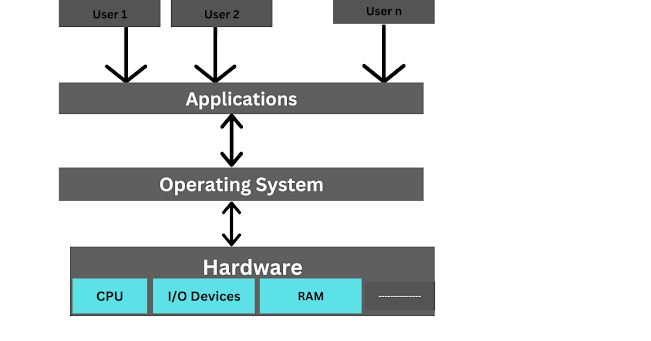Operating System
An operating system is a program that manages the computer hardware. It also provides a basis for application programs and acts as an intermediary between the computer user and the computer hardware. An amazing aspect of operating system is how varied they are in accomplishing these tasks. Mainframe operating system are designed primarily to optimize utilization of hardware. Personal computer operating system support complex games, business application, and everything in between. Operating systems for handheld computers are designed to provide an environment in which a user can easily interface with the computer to execute programs. Thus, some operating system are designed to be convenient, others to be efficient, and others some combination of the two.
Before we can explore the details of computer system operation, we need to know something about system structure. We begin by discussing the basic functions of system startup, I/O, and storage. We also describe the basic computer architecture that makes it possible to write a functional operating system.
Because an operating system is large and complex, it must be created piece by piece. Each of these pieces should be a well-delineated portion of the system, with carefully defined inputs, outputs and functions .
What is an Operating System ?
Operating System is a collection of set of programs, which manages all the resources of the Computer System.
It is an intermediator between the user and hardware.
The purpose of an operating system is to provide an environment in which a user can execute programs convenient and efficient manner.
- Process Management
- Memory Management
- I/O Management
- Support functions
- Networking
- User interface
- Security
Types of Operating System

- Batch Operating System
- Multiprogramming Operating System
- Multitasking Operating System
- Network Operating System
- Real Time Operating System
- Time-Sharing Operating System
- Distributed Operating System
Operating System Advantages:
- Operating system provides a GUI interface for the user in the form of menu, icons and buttons.
- Operating system also allow us to sharing the resources with other users.
- It help user to understand the functions of a computer.
- In is very easy to use.
- It can be easily updated.
Operating System Disadvantages:
- If the Operating system is corrupted than it will affect intire system and the computer system.
- Only some task run at a time.

Comments
Post a Comment